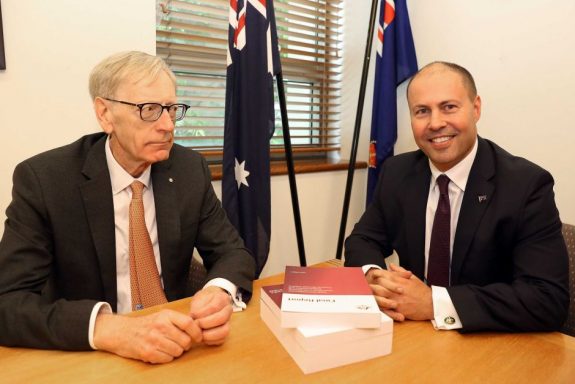Comedy without art (part 15)

By Dr George Venturini
At the time of official delivery of the Final Report of the Banking Royal commission, Commissioner Hayne and Treasurer Josh Frydenberg were asked by a photographer to shake hands. Hayne said a clear ‘no’ while Frydenberg smiled awkwardly.
Perhaps because by now Commissioner Hayne knew of the correspondence between Dr. Henry and Treasurer Morrison?
On 5 February 2019 the Morrison government rushed to announce certain new measures:
1) Requiring mortgage brokers to act in the best interests of borrowers by law,
2) Removing conflicts of interest between brokers and lenders by banning trailing commissions from 1 July 2020,
3) Reviewing the changes after three years on the implications of removing up-front commissions and moving to a borrower-pays system for mortgage advice,
4) Ensuring that super funds have only one default account for new members entering the system,
5) Protecting vulnerable consumers against unsolicited selling for super and insurance products,
6) Banking the deduction of any advice fees from MySuper accounts,
7) Establishing a comprehensive national scheme for farm debt mediation,
8) Supporting the elimination of default interest loans in areas affected by natural disasters.
Treasurer Frydenberg confirmed that the government would act to expand the jurisdiction of the Federal Court to cover corporate criminal misconduct to expedite the consideration of cases brought by regulators.
“My message to the financial sector is that the misconduct must end and the interests of the consumers must now come first. From today the sector must change, and change forever,” Mr. Frydenberg said.
Over the following days reactions and responses would come from a lot of sources to the Report’s recommendations – from politicians, consumers who have been hurt by bad behaviour, sometime of the criminal kind, as well as from the banks and insurers themselves, communicating their highly crafted, prepared-well-in-advance statements.
However, what we may not hear and see are the presence in the corridors of Parliament, of banking and insurance lobbyists seeking to water down, chip away at and wind back any meaningful reform.
The consumer movement had been there before. In fact, watering down of possible legislation is the key reason for the mess which afflicts the sector. Time and time again effective reform is proposed and rendered ineffective – even useless – through the well-resourced lobbying power of the financial services sector.
Before the release of the Report, some alarmists started warning that “The sky is falling!” One can already hear voices claiming that “More regulation will have a chilling effect on the supply of credit.” or, to put it more elegantly, that “There is such a thing as regulatory overreach !” And there will be undocumented news along with more considered observations: “The economy is teetering, house prices are falling and consumer spending is down. Now is not the time to change course or upset the markets!” One will be asked to consider the proverbial ‘unintended consequences’.” (K. Cox, ‘Now Hayne has reported, the lobbyists will get to work,’ The Sydney Morning Herald, 5 February 2019).
- D) Despite the very useful and not-unexpected revelations from the Royal Commission’s public hearings, and a number of important recommendations, the Final Report largely conforms to the pre-arranged terms of reference that Malcolm Turnbull and the banks wrote for Commissioner Hayne.
Here is a blunt question: is this the reason Prime Minister Turnbull chose Kenneth Madison Hayne A.C., Q.C., knowing that he would stay within the narrow guidelines? Or, is this the reason there was clear tension between Commissioner Hayne and Treasurer Josh Frydenberg when Hayne handed over his Final Report on 1 February 2019? Had Commissioner Hayne been leaned on in any way to constrain his recommendations, especially in relation to structural separation ?
Whatever the case, his recommendations do not fit the severity of the crimes and misconduct that his public hearings and his formidable counsels assisting, Ms. Rowena Orr Q.C. and Mr. Michael Hodge Q.C., relentlessly exposed over ten months in 2018. Presumably, Commissioner Hayne might have been embarrassed that shares in the Big Four banks and A.M.P. and I.O.O.F. soared on 5 February, causing headlines such as “Australian Banks surge by most in a decade on inquiry reprieve” ” (P. Vercoe, ‘Australian banks surge by most in a decade on Inquiry,’ bloomberg.com; and ‘Banks surge after royal pardon’, Banks surge after royal pardon, theaustralian.com.au).
Ms. Adele Ferguson, the tireless investigative journalist, whose work became the prime mover as a continuing exposé of malfeasance in the financial services sectors which ultimately led to the Royal Commission, noted in The Sydney Morning Herald of 5 February: “For those Australians hoping for structural separation of the banks, an overhaul of the regulators or heads on sticks, Royal Commissioner Kenneth Hayne’s verdict would have been disappointing. There was little blood and gore. It was more like a soft landing. The royal commission spent a year listening to how many ways government regulators failed in their duty to regulate the financial services industry. Customers were ripped off but the regulators had little or no appetite to use the tools at their disposal, preferring instead to do cosy deals with those they were meant to police. Despite this, Commissioner Hayne is giving them more powers and more work and has faith they will now actually do their job. He recommends additional co-regulation, which could be an excuse for more buck-passing.”
It is difficult to understand why there is so much media emphasis, both in favour and against, on vertical integration and separation. Because that is the issue, which is at the heart of all banking misconduct and exploitation of customers. If the banks which hold deposits did not own other financial businesses, obviously they would not profit from strongly directing their depositors into those other businesses, or from gambling with their deposits. The two-decade experiment with integrated banking has been a spectacular failure for customers and the economy, and a boon only for bankers’ bonuses. Separation is the one conclusion that the banks feared the most. It could become contagious – other governments around the world might be encouraged to adopt it.
And this is where the Final Report fails. Commissioner Hayne did recommended reforms to stop the specific ways in which the banks were shown to exploit their customers. However, he did not proceed to recommending the end of the vertical, integrated structure which is the cause of the exploitation.
It could be that Commissioner Hayne, feeling the extreme pressure from the beginning – which might explains his discomfort with Treasurer Frydenberg – has strictly kept within his pre-arranged terms of reference. The responsibility to find a solution to the problem is with Parliament, not with a Royal Commissioner.
A participant electorate would understand that, and consequently demand of its representatives that they provide the necessary remedy.
The first and most important change is to break up the banks through a statutory separation of commercial banking from investment banking and other financial services.
Two proposals to that effect were awaiting consideration at the prorogation of Parliament. One was the Banking System Reform (Separation and Banks) Bill, presented by Mr. Bob Katter M.P. on 25 June 2018, and seconded by Mr. Andrew Wilkie M.P.
A similar Bill was introduced before the Senate on 12 February 2019 by Sen. Pauline Hanson.
- E) Tim Colebatch suggested that the banks should be more like a department store: “I came, I saw, I bought.”
He observed that Kenneth Madison Hayne, A.C., Q.C. ended his task as royal commissioner with impressive restraint. Confronted by an appalling culture of exploitation of customers by banks and other financial institutions, laid bare in heartbreaking evidence to the Commission’s hearings, he proposed just one big reform to Australia’s financial system, buttressed by exhortations and subtle changes aimed at reforming that culture.
“Whether it is enough to turn greedy banks into good citizens, only time will tell. For reasons beyond Hayne’s control, one can’t be optimistic. Australia’s four major banks form a de facto cartel that is extremely powerful and without serious competition. By and large, businesses and households who need to borrow money have nowhere else to go.” [Emphasis added]
An always thoughtful and wise Tim Colebatch has warned that, quite likely even with a better government than ATM – and that should not be difficult, really – “Australia’s four major banks form a de facto cartel that is extremely powerful and without serious competition. By and large, businesses and households who need to borrow money have nowhere else to go.” (T. Colebath, ‘Why the banks should be more like Bunnings’, insidestory.org.au, 6 February 2019).
One might well remember the experience of a serious Labor Government, such as that of Gough Whitlam, with the mis-fortunate Trade Practices Commission, provided by its originator with “the best antitrust in the world”, and yet administered in the most pavid way, servile on occasions, much as the present tools of political-economic control at the disposal of the government are. By the time John Winston Howard took charge of that moribund institution and made it much more to his image and desire, it was turned into a poshlost – a word of the Russian language, frequently used by writers such as Dostoyevsky, Turgenev, Checov, Gogol and Nabokov and many others lesser known. The word has remained easily untranslatable into English.
Nabokov makes an interesting use of the word with reference to ‘pseudo-literature’. He calls it “corny trash, vulgar clichés, Philistinism in all its phases, imitations of imitations, bogus profundities, crude, moronic and dishonest.” There is a lesser known translation: “a frightening, debasing vulgarity – even of a metaphorical kid.”
The Grand Vizier of Australian conservatism, John Winston Howard, O.M., A.C., went one further that old reference: he labelled the Hayne’s Final Report: “rank socialism.”
How absolutely Churchillian!
Continued Saturday – Terminal adolescents (part 1)
Previous instalment – Comedy without art (part 14)
 Dr. Venturino Giorgio Venturini devoted some seventy years to study, practice, teach, write and administer law at different places in four continents. He may be reached at George.venturini@bigpond.com.au.
Dr. Venturino Giorgio Venturini devoted some seventy years to study, practice, teach, write and administer law at different places in four continents. He may be reached at George.venturini@bigpond.com.au.
Like what we do at The AIMN?
You’ll like it even more knowing that your donation will help us to keep up the good fight.
Chuck in a few bucks and see just how far it goes!
Your contribution to help with the running costs of this site will be gratefully accepted.
You can donate through PayPal or credit card via the button below, or donate via bank transfer: BSB: 062500; A/c no: 10495969










1 comment
Login here Register here-
Return to home pagePingback: Terminal adolescents (part 1) - » The Australian Independent Media Network